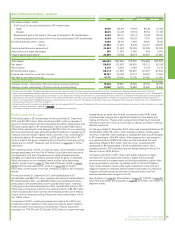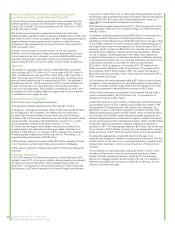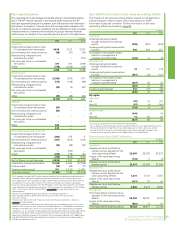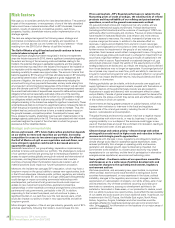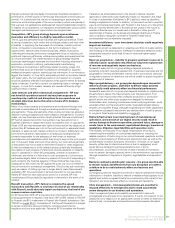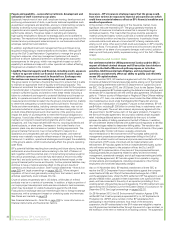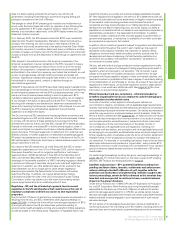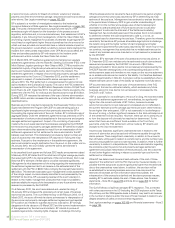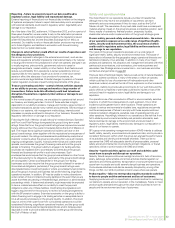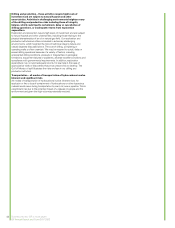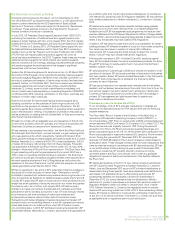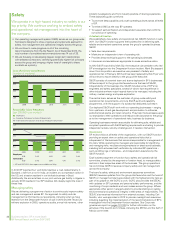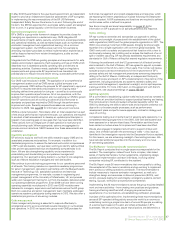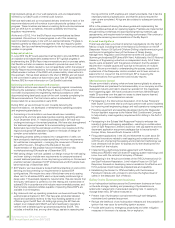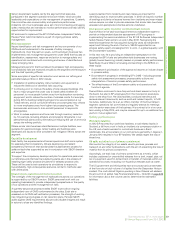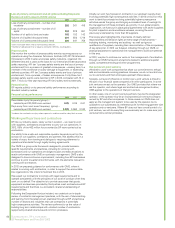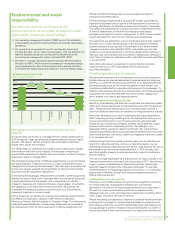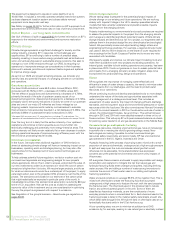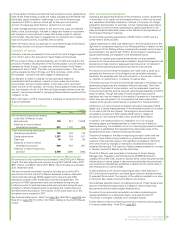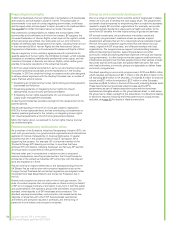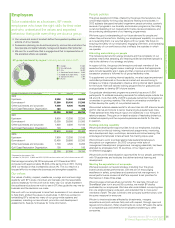BP 2012 Annual Report Download - page 47
Download and view the complete annual report
Please find page 47 of the 2012 BP annual report below. You can navigate through the pages in the report by either clicking on the pages listed below, or by using the keyword search tool below to find specific information within the annual report.
Business review: BP in more depth
Business review: BP in more depth
BP Annual Report and Form 20-F 2012
45
Further note on certain activities
During the period covered by this report, non-US subsidiaries or other
non-US entities of BP conducted limited activities in, or with persons from,
certain countries identified by the US Department of State as State
Sponsors of Terrorism or otherwise subject to US sanctions (‘Sanctioned
Countries’). These activities continue to be insignificant to the group’s
financial condition and results of operations.
In July 2012, US President Obama signed Executive Order 13622 (‘EO’)
authorizing the imposition of additional sanctions against persons who
engage in certain dealings with Iran, and in August 2012, the US Congress
enacted the US Iran Threat Reduction and Syria Human Rights Act of 2012
(‘ITRA’). Further, on 3 January 2013, US President Obama signed into law
the National Defense Authorization Act for Fiscal Year 2013, containing a
subtitle known as the Iran Freedom and Counter-Proliferation Act of 2012
(‘IFCPA’) that will impose additional sanctions against Iran when its
provisions become effective in July 2013. Together, these measures impose
additional sanctions against Iran which include new sanctions against
persons involved with Iran’s energy, shipping and petrochemicals industries,
and sanctions against financial institutions that engage in significant
transactions with the Iran Central Bank.
Similarly the EU has strengthened its sanctions on Iran. On 23 March 2012
the Council of the European Union extended its existing measures against
Iran by promulgating Regulation 267/2012 which included a prohibition on
the import, purchase and transport of Iranian-origin crude oil and petroleum
products. Further, on 15 October 2012, the EU announced new restrictive
measures against Iran and certain Iranian entities, including Naftiran
Intertrade Co. Limited, some of which were effective immediately, and
some of which were implemented by an amending Regulation (1263/2012)
on 22 December 2012, including a prohibition on the import, purchase and
transport of Iranian-origin natural gas.
Both the US and the EU have enacted strong sanctions against Syria,
including a prohibition on the purchase of Syrian-origin crude and a US
prohibition on the provision of services to Syria by US persons. The EU
sanctions against Syria include a prohibition on supplying certain equipment
used in the production, refining, or liquefaction of petroleum resources as
well as restrictions on dealing with the Central Bank of Syria and numerous
other Syrian financial institutions.
BP seeks to comply with all applicable laws and regulations of the US, the
EU and other countries where BP operates, and monitors its activities with
Sanctioned Countries and persons from Sanctioned Countries.
BP has interests in and operates two fields – the North Sea Rhum field and
the Azerbaijan Shah Deniz field – and has interests in a gas marketing entity
and a gas pipeline entity which, respectively, market and transport Shah
Deniz gas (both entities and related assets are located outside Iran), in which
Naftiran Intertrade Co. Limited and NICO SPV Limited (collectively, ‘NICO’)
or Iranian Oil Company (UK) Limited (‘IOC UK’) have interests. Production
was suspended at the North Sea Rhum field (in which IOC UK has a 50%
interest) in November 2010 and Rhum remains shut-in. The Shah Deniz field,
its gas marketing entity and the gas pipeline entity (in which NICO has a
10% or less non-operating interest) continue in operation. The Shah Deniz
joint venture and its gas marketing and pipeline entities were excluded from
the main operative provisions of the EU Regulations as well as from the
application of the new US sanctions, and fall within the exception for certain
natural gas projects under Section 603 of ITRA.
BP has no operations in Iran and it is BP’s policy that it shall not purchase or
ship crude oil or other products of Iranian origin. Participants in non-BP
controlled or operated joint ventures may purchase Iranian-origin crude oil or
other components as feedstock for facilities located outside the EU and US.
It is also BP‘s policy that BP shall not sell crude oil or other products into Iran,
except that small quantities of lubricants are sold to non-Iranian third parties
for resale or use in Iran. Further, until January 2010, BP held an equity
interest in an Iranian joint venture that blended and marketed automotive
lubricants for sale to domestic consumers in Iran. BP sold its equity interest
but continues to sell small quantities of automotive lubricants and
components and licence relevant trade marks to the current owner.
Transactions with Iranian shipping companies have been terminated. BP
currently holds a non-controlling interest in a non-BP operated joint venture
which sells crude oil to an Indian entity in which NICO holds a minority,
non-controlling stake. In 2012, BP distributed certain scrip dividends to BP
shareholder Naftiran Intertrade Co. Limited in accordance with applicable UK
law in effect at the time of such scrip dividend distributions. In accordance
with relevant EU sanctions under EU Regulation 945/2012, BP has withheld
scrip dividend distributions to Naftiran Intertrade Co. Limited from October
2012.
BP has become aware that a Canadian university had been using graduate
students, some of whom were nationals of Iran, on a research programme
funded in part by BP. BP has suspended such programme and made an initial
voluntary disclosure to the US Treasury Department’s Office of Foreign Assets
Control (‘OFAC’), and is currently reviewing these activities to determine to what
extent, if any, the activities may have violated OFAC Regulations.
In addition, BP has become aware that in 2010, as consideration for certain
auditing services, BP effected a transfer of funds to a local Iranian consulting
firm which may have been in violation of relevant EU notification
requirements. BP is reviewing this funds transfer to determine to what
extent, if any, BP may have violated relevant EU regulations.
Following the imposition in 2011 of further US and EU sanctions against
Syria, BP terminated all sales of crude oil and petroleum products into Syria,
though BP continues to supply aviation fuel to non-governmental Syrian
resellers outside of Syria.
BP sells lubricants in Cuba through a 50:50 joint venture and trades in small
quantities of lubricants. BP sold small quantities of lubricants to third parties
that were resold in Sudan; BP has terminated these sales. In the first quarter
of 2013, BP sold a small quantity of lubricants to a third-party drilling
company for use in Myanmar.
BP has equity interests in non-operated joint ventures with air fuel sellers,
resellers, and fuel delivery services around the world. From time to time, the
joint venture operator may sell or deliver fuel to airlines from Sanctioned
Countries or flights to Sanctioned Countries without BP’s knowledge or
consent. BP has registered and paid required fees for patents and
trade marks in Sanctioned Countries.
Disclosure pursuant to Section 219 of ITRA
To our knowledge, none of BP’s activities, transactions or dealings are
required to be disclosed pursuant to ITRA Section 219, with the following
possible exceptions:
The Rhum field (‘Rhum’), located in the UK sector of the North Sea, is
operated by BP Exploration Operating Company Limited (‘BPEOC’), a
non-US subsidiary of BP. Rhum is owned under a 50:50 unincorporated joint
venture between BPEOC and Iranian Oil Company (U.K.) Limited (‘IOC’). The
Rhum joint venture was originally formed in 1974. During the period of
production from Rhum, the Rhum joint venture supplied natural gas and
certain associated liquids to the UK. On 16 November 2010, production from
Rhum was suspended in response to relevant EU sanctions. Rhum remains
shut-in. During the year ended 31 December 2012, BP recorded gross
revenues of £7,329.49 related to Rhum due to changes in prices related to
hydrocarbon stock. These changes in prices were non-cash transactions that
were recorded as revenue in accordance with BP accounting policy. BP had
no net profits related to Rhum during the year ended 31 December 2012,
recording an overall loss. BP currently intends to continue to hold its
ownership stake in the Rhum joint venture, and to meet any applicable
obligations in respect of safety and maintenance of the facilities related to
the Rhum field.
BP distributed dividends in the form of new ordinary shares in accordance
with BP’s Scrip Dividend Programme to Naftiran Intertrade Co. Limited in
March, June and September 2012 as part of BP’s dividend distributions to
shareholders during those periods. Such scrip dividends were distributed in
accordance with applicable UK law in effect during such periods. BP
subsequently declared and distributed a dividend to shareholders in
December 2012, but a scrip alternative was not distributed to Naftiran
Intertrade Co. Limited in accordance with relevant EU sanctions under EU
Regulation 945/2012 which took effect in October 2012. As at 1 March
2013, Naftiran Intertrade Co. Limited is the registered owner of ordinary
shares in BP amounting to less than 0.15% of BP’s total outstanding ordinary
shares. BP intends to withhold or to procure the withholding of distribution
of any form of dividends to Naftiran Intertrade Co. Limited until such time
as applicable laws or regulations permit such distribution.


